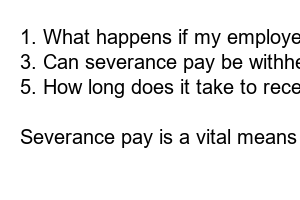퇴직금 조회
Title: Understanding Severance Pay: An Inquiry into Employee Rights
Introduction:
Severance pay is a crucial aspect of employment for both employers and employees. In this blog post, we will delve into the intricacies of severance pay, exploring the rights of employees and shedding light on the importance of this compensation package. So, whether you are an employer curious about your obligations or an employee seeking clarity, read on to gain valuable insights.
1. What is Severance Pay?
Severance pay refers to the compensation provided to employees who are terminated from their jobs due to reasons such as lay-offs, downsizing, or company closures. It serves to lessen the financial impact of job loss and offers a transitional period to secure alternative employment.
2. Factors Determining Severance Pay:
Various factors influence the determination of severance pay, such as the length of an employee’s service, position held, and specific employment contract terms. Additionally, local labor laws and company policies may also play a role in defining the amount and duration of severance pay.
3. Employee Rights and Legal Obligations:
In many jurisdictions, severance pay is not mandatory unless it is stipulated in an employment contract or collective bargaining agreement. Nonetheless, labor laws often outline employee rights concerning severance pay, ensuring fair compensation in certain situations. Understanding these legal obligations is crucial for both employers and employees.
4. Negotiating Severance Packages:
When facing termination, employees may have an opportunity to negotiate their severance packages. This process involves discussions with their employers regarding the terms of their compensation, such as additional pay, extended healthcare coverage, or career counseling. It is vital for employees to be well-informed and seek professional advice to maximize their negotiations.
5. Tax Implications of Severance Pay:
Severance pay is taxable in most jurisdictions, with the exception of select components like medical coverage. Understanding the tax consequences of severance pay is essential for employees to accurately plan their finances during the transition period.
6. Alternatives to Severance Pay:
While severance pay is the most common form of compensation in cases of job loss, some companies may offer alternatives. These alternatives can include extended notice periods, job placement assistance, or opportunities for redeployment within the same organization. It is crucial for employees to be aware of these options and evaluate them carefully.
FAQs:
1. What happens if my employer refuses to provide severance pay?
2. Is severance pay the same as termination pay?
3. Can severance pay be withheld for poor performance?
4. Are there any legal limitations on severance packages?
5. How long does it take to receive severance pay?
6. Can severance pay affect my eligibility for unemployment benefits?
Summary:
Severance pay is a vital means of supporting employees during challenging times of job loss. It is essential for both employers and employees to understand the rights, obligations, and processes associated with severance pay. By doing so, individuals can navigate this transitional period with confidence and make informed decisions that prioritize their financial well-being and future career prospects.

